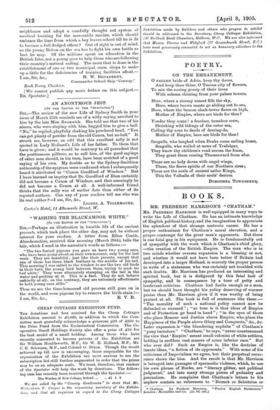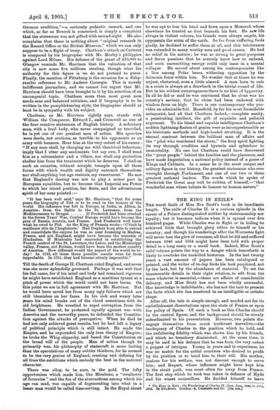BOOKS.
MR. FREDERIC) HARRISON'S "CHATHAM." 211.1t. FREDERIC HARRISON is well equipped in many ways to write the Life of Chatham. He has an intimate knowledge of English political history, and the imagination to appreciate 'the splendour of that strange meteoric career. He has a proper enthusiasm for Chatham's moral elevation, and a proper contempt for the great man's opponents. But there is one fatal gap in his equipment. He is fundamentally out of sympathy with the work which is Chatham's chief glory, —the creation of the British Empire. The man who is in two minds whether oversea expansion is a blessing or not, and whether it would not have been better if Britain had developed into a larger Holland, is scarcely the proper person to write of a statesman who was certainly not troubled with such doubts. Mr. Harrison has produced an interesting and spirited book, but it is disfigured by this fatal lack of sympathy, and in consequence by a tone of petty and irrelevant criticism. Chatham had faults enough as a man, but we should have thought his policy deserving of warmer praise than Mr. Harrison gives if it was worthy of being praised at all. The book is full of sentences like these:— " The morality of such a national policy cannot now be defended or excused " ; "so true is it that ideas of Empire and of Protection go hand in hand"; "in the eyes of those who place Honour and Justice above Empire, who place the Happiness of the People above Glory and Conquests," &c., 8r.c. Later expansion is "the blundering exploits" of Chatham's "puny imitators." "Chatham," he says, "never countenanced the view that Empire' meant small colonies of white settlers, holding in serfdom vast masses of some inferior race." But who ever did? Such an Empire is, like the doctrine of innate ideas, "a fiction of its opponents." With some of his criticisms of Imperialism we agree, but their perpetual recur- rence shows the bias. And the result is that Mr. Harrison is betrayed into passages of spasmodic violence, which, to use his own phrase of Burke, are "literary glitter, not political judgment," and into many strange pieces of pedantry and journalism. He complains that Chatham's letters to his nephew contain no references to " Brunck or Schiitzius or • Chatham. By Frederic Harrison. "Twelve English Statesmen." London Macmillan and Co. L2s. ad. net.] that the statesman was not gifted with second-sight. He also complains that there is nothing about "original research in the Record Office or the British Museum," which we can only
suppose to be a flight of irony. Chatham's attack on Carteret is compared by his biographer with Mr. Morley's philippics against Lord Milner. His defence of the grant of £10,000 to Glasgow reminds Mr. Harrison that the valuation of that city is now some five millions sterling, though what his authority for this figure is we do not pretend to guess. Finally, the mention of Pittsburg is the occasion for a dithy- rambic reference to Mr. Andrew Carnegie. This is merely indifferent journalism, and we cannot but regret that Mr. Harrison should have been brought to it by his selection of an uncongenial topic. Chatham more than most great men needs sane and balanced criticism, and if biography is to be written in the pamphleteering style, the biographer should at least be in sympathy with his subject.
Chatham, as Mr. Harrison rightly says, stands with William the Conqueror, Edward I., and Cromwell as one of the four creative statesmen of English history. A sedentary man, with a frail body, who never campaigned or travelled, he is yet one of our greatest men of action. His speeches were deeds, not orations, as terrible to his opponents as an army with banners. Hear him at the very outset of his career : "If any man shall, by charging me with theatrical behaviour, imply that I utter any sentiments but my own, I shall treat him as a calumniator and a villain, nor shall any protection shelter him from the treatment which he deserves. I shall on such an occasion, without scruple, trample upon all those forms with which wealth and dignity entrench themselves, nor shall anything but age restrain my resentment." He saw that England's destiny was not to play a minor part in European squabbles, but to become that Imperial sea Power to which her island position, her fleets, and the adventurous spirit of her sons pointed :—
"It has been well said," says Mr. Harrison, "that for some years the biography of Pitt is to be read in the history of the world. His influence was felt in Europe, in India, in Africa, in America: from the Baltic to the St. Lawrence, from the Mediterranean to Bengal. . . . . . If Frederick had been crushed in the Seven Years' War, Central Europe would have become the prey of Russia, Austria, and France. And Frederick well knew what he owed to Pitt. ' As the King of Prussia wrote= C'etait la meillenre tete de rAngleterre.' Had Dupleix been able to extend and consolidate the empire he was so near founding in Madras, France, and not England, might have become the suzerain of Hindustan. If Montealm had succeeded in establishing the French control of the St. Lawrence, the Lakes, and the Mississippi valley, France, not Britain, would have been the mother country of America. How diffprent would the aspect of the world be to- day ! In 1765, all these three possible results were far from improbable. In 1761, they had become utterly impossible."
Till the death of George II. Chatham ruled England, and never was she more splendidly governed. Perhaps it was well that
his fall came, for if his mind and body had remained vigorous he might have established England as a maritime tyrant at a pitch of power which the world could not have borne. On this point we are in full agreement with Mr. Harrison. But he would have saved her from many ugly failures which are still blemishes on her fame. In his sick and weary later years his mind breaks out of the cloud sometimes with its old brightness. He wrestled to expel corruption from the Indian Government, he protested equally against war with America and the unworthy peace, he defended the Constitu- tion against the attacks of prerogative. When he died he bad not only achieved great results, but he had left a legacy
of political principle which is still intact. He made the Empire, and he expounded the only true theory of Empire;
he broke the Whig oligarchy, and based the Constitution on the broad will of the people. Man of action though he primarily was, his philosophy of statecraft is more lasting than the speculations of many subtler thinkers, for he seemed to be the very genius of England, creating and defining for all time the ambitions which embody the best in the national character.
There was alloy, to be sure, in the gold. The lofty opportunism which made him, like Mirabean, a "swallower of formulas" and the foe of the abstractions among Which his age ran mad, was capable of degenerating into what in a lesser man would be called time-serving. . In the Royal closet he was apt to lose his head and fawn upon a Monarch whom elsewhere he treated as dust beneath his feet. He saw life always in violent colours, his friends were always angels, his opponents the scum of the earth. So far from suffering fools gladly, he declined to suffer them at all, and this intolerance was extended to many worthy men and good causes. He had no relief in his nature ; he was so strung to great purposes and fierce passions that he scarcely knew how to unbend, and such unremitting energy could only issue in a mental collapse. He moved about among his contemporaries like a lion among Polar bears, withering opposition by the daimonic force within him. No wonder that at times he was unjust, rhetorical, even a little absurd. A man born to rule in a crisis is always at a drawback in the trivial round of life. But in his wildest extravagances there is no hint of hypocrisy. In all he did or said he was convinced that he alone was his country's saviour, that he alone had been endowed with wisdom from on high. There is one contemporary who pro- vides an admirable foil. Mansfield, by far his most formidable antagonist, had all that Chatham lacked,—complete sanity, a penetrating intellect, the gift of exquisite and pellucid argument. To his bland and capable intelligence Chatham's sudden lightning-flashes of genius were as incomprehensible as his histrionic methods and high-heeled strutting. It is the eternal contrast between the brilliant man of affairs and the "pilot who weathered the storm," the fiery spirit fighting its way through crudities and hysteria and splendour to immortality. No one but Chatham could have discovered the "great people" behind the families and the placemen, and have made Imperialism a national policy instead of a game of Kings and Cabinets. In a .sense he is the most unique and solitary figure in our history, the greatest statesman who ever wrought through Parliament, and one of our two or three greatest national leaders. The words which he spoke of Frederick the Great may well be written of himself,—" that wonderful man whose talents do honour to human nature."











































 Previous page
Previous page